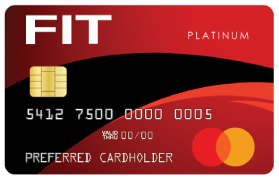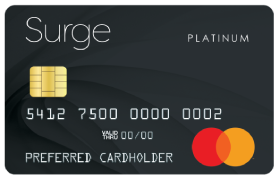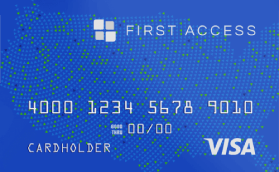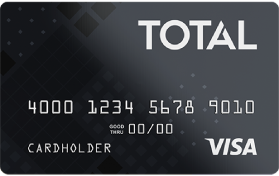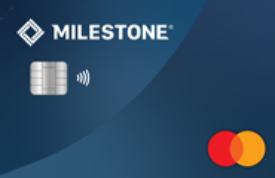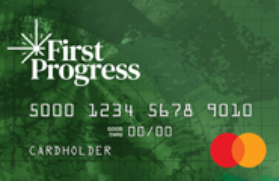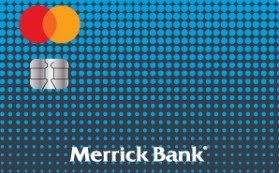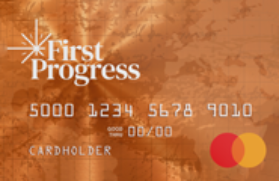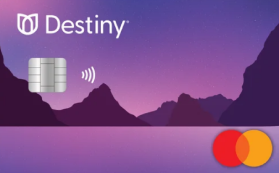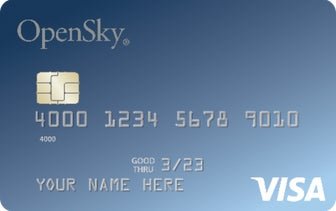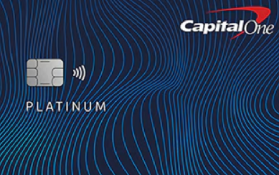Short Review of Best Credit Cards for Bad Credit
| Name | Best for | Rewards Rate | APR | Apply |
|---|
FIT™ Platinum Mastercard® | Unsecured | This card doesn't offer cash back, miles or points. | 35.90% Fixed | Apply now On Continental Finance site |
Celtic Bank Surge® Platinum Mastercard® | Walmart purchases | This card doesn't offer cash back, miles or points. | 35.90% Fixed | Apply now On Celtic Bank‘s site |
| | 1% Cash Back rewards^^ on payments made to your Revvi Credit Card. | 35.99% * | Apply now On the Revvi secure website |
| Low income | 1% Earn 1% cash back rewards on payments made to your First Access Credit Card. | 35.99% | Apply now On the First Access Visa® Card secure website |
| | 1% Cash Back on all purchases. | 35.99% * | Apply now On the Total Visa® Card secure website |
| Unsecured | This card doesn't offer cash back, miles or points. | 35.9% | Apply now On Milestone Mastercard® website |
First Progress Platinum Prestige Mastercard® Secured Credit Card | | 1% Cash Back rewards on payments. | 14.24% Variable | Apply now On First Progress’s site |
Merrick Bank Secured Credit Card | | This card doesn't offer cash back, miles or points. | 22.70% Variable | Apply now On Merrick Bank‘s site |
First Progress Platinum Select Mastercard® Secured Credit Card | | 1% Cash Back on payments made to your First Progress Secured credit card account. | 18.24% Variable | Apply now On First Progress’s site |
The Bank of Missouri Destiny® Mastercard® | Unsecured | This card doesn't offer cash back, miles or points. | 35.9% | Apply now On The Bank of Missouri‘s site |
Capital Bank OpenSky® Secured Visa® | 18 year old | This card doesn't offer cash back, miles or points. | 25.64% Variable | Learn more |
Capital One Platinum Secured Credit Card | Single mom, Without SSN | This card doesn't offer cash back, miles or points. | 29.99% Variable | Learn more |
Card's description:
Celtic Bank Surge® Platinum Mastercard®
Those who want to rebuild credit will appreciate the Surge® Platinum Mastercard®, which enables them to stay on top of their credit. You can apply online, and if approved and enrolled in e-statements, you'll get free access to your monthly credit score.
The Surge® Platinum Mastercard® also offers cardholders a solid credit limit between $300 - $1,000 with no security deposit. Your account will get automatically reviewed after six months for a potential increase. Unfortunately, the card comes with a high annual fee $75 - $125 and a high APR of 29.99%. Don’t forget about the monthly maintenance fee, which kicks in after the first year at $10 per month. If you're reckless with your payments, you might end up paying a late and a returned payment fee too. So be very cautious if you go for this card because if not, you might end up in a worse financial situation than before getting it.
Read more about Celtic Bank Surge® Platinum Mastercard®
First Progress Platinum Prestige Mastercard® Secured Credit Card
The First Progress Platinum Prestige Mastercard® Secured from Synovus Bank is one of the three secured credit cards they offer. There's no minimum credit score or credit history required, and those who qualify for one of the three cards also qualify for the other two. We decided to review this one because it has the lowest APR out of the three but also the highest annual fee. So, it's basically a trade-off, either a low APR or a low annual fee, whatever is more important to you.
This card has one of the lowest APRs overall – 14.24%, which is great for those who struggle with balances. However, the price to pay for such a low APR is a $49 annual fee deducted from your line of credit. When a payment is late or returned, penalty fees will be applied too.
Read more about First Progress Platinum Prestige Mastercard® Secured Credit Card
Capital Bank OpenSky® Secured Visa®
With a straightforward, 4-step application process and no credit check, the OpenSky® Secured Visa® credit card is an excellent choice for anyone without a credit score or with a bad one. Those who don’t have a checking account can apply too. They'll be able to make the security deposit with a money order or a Western Union payment.
The security deposit range is also explicitly listed on the card's website. It can be as low as $200 and up to $3,000 (please note that the amount is subject to approval and is individually determined for each applicant). Your line of credit will be equal to the security deposit's amount. You can also request a credit limit increase whenever you want, and if approved, you'll have to provide an additional security deposit.
This card has one of the lowest APRs in the category (17.39%) and among all credit cards, considering the average credit card APR is 14.58%. Its annual fee is only $35, which we think is a low price for such a great card for building credit.
Read more about Capital Bank OpenSky® Secured Visa®
Capital One Platinum Secured Credit Card
The Platinum Secured Mastercard® from Capital One allows you to get pre-approved without hurting your credit score. It's a nice card for building credit that has a very low minimum security deposit. Based on your credit score, you can get the card with a deposit of $49, $99, or $200. With the minimum deposit required of $49, you'll get an initial credit limit of $200. Your account will get reviewed automatically every six months, and you might be considered for a higher credit line. As your account is monitored, you may get your security deposit back as a statement credit. Of course, all of this is only possible if you've made timely payments and managed the card responsibly.
Capital One offers great benefits with all of its credit cards, so cardholders of the Platinum Secured Mastercard® will enjoy them too. These include valuable features: CreditWise tool (enables you to monitor your credit), Virtual Card Number, Extended Warranty, 24/7 Customer Service, etc.
Finally, on the good side, you won’t have to worry about an annual fee. However, you’ll have to be very careful with carrying a balance due to the high APR of 28.49%.
Read more about Capital One Platinum Secured Credit Card
What is bad credit?
Bad credit is usually defined as having a FICO credit score rating below 580 (on a scale between 300 and 850). Lower credit score indicate irresponsible credit behavior in the past, like not paying bills on time, loan defaults, bankruptcy, late payments, maxing out credit lines, etc. That’s why a bad credit might make creditors and lenders reluctant when deciding whether to approve a credit request. There are three major credit bureaus (TransUnion, Equifax, and Experian), and credit scores might differ between all three. That’ll depend on whether your creditor (or lender) reports to one, two, or all of them. Note that creditors might use their scoring models as well, and they will also differ. If approved for a loan or a credit card, those with bad credit will likely get subprime rates. Subprime rates are higher than the average interest rates and are offered to high-risk borrowers.
How to improve your credit using a credit card?
A credit card can be a useful tool on your path to repair credit only if used in a responsible manner. Here's some advice on how to make that happen:
- Make payments on time – this one probably goes without saying, but it doesn't hurt to be reminded. Make sure to pay at least the minimum amount before the due date. Although, note that if you fail to pay the balance in full, you’ll accrue interest (think about the high APRs that come with credit cards!).

Extra tip: Set up AutoPay (if the card offers this option) or set a reminder on your phone. Of course, some creditors also send you a notification ahead of the upcoming payment date.
- Keep in mind the credit utilization ratio – the credit utilization ratio is a significant factor with a great impact on your credit score. Generally, it's recommended to keep it under 30%. That means that if you have a $1,000 credit line, you should never carry a balance that's more than $300.

Extra tip: Annual fees usually get deducted from the credit line, so don’t forget to factor them in when calculating your credit utilization!
- Monitor your credit score – many of the best credit cards for bad credit listed above (like Capital One Platinum Secured Mastercard®) offer you credit score access. That allows you to always be on top of your credit and see how certain spending habits affect it.
- Avoid closing credit card accounts – closing your accounts might harm your credit score. For example, it might increase your credit utilization ratio, which you don't want to happen if you're trying to improve bad credit. If you want to close it because of an annual fee or to get back your security deposit, if possible, consider changing to a no-annual-fee version of the card or upgrading to an unsecured one. With the Discover it® Secured credit card, you might qualify for an unsecured card in as little as eight months.
Who should get a credit card for bad credit?
In addition to people with bad credit, of course, credit cards for bad credit might also serve well to people with no or little credit history. These two are put in the same basket because people without an established credit history also represent a risk to creditors and lenders. They have yet to prove to be trustworthy borrowers.
For instance, if you’re a student, you probably won’t have it easy to get a credit card (if you haven’t had a regular job or are paying off a student loan). Since cards designed for applicants with bad credit make it easy to qualify, they make for a worthy starter option.
How to choose a credit card for bad credit?
Choosing a credit card for bad credit requires careful consideration. You want to ensure that it’s the right card that’ll help you repair credit. Another important thing to bear in mind when applying is to assess your chances of getting approved for a particular card. A rejection never looks good on a credit report, and it will furtherly decrease your credit score. If you're not sure about your approval odds, first try applying for a card that offers prequalification. Such cards are Capital One Platinum Secured Mastercard®, and Petal® 1 "No Annual Fee" Visa®.
The most important thing to look at in a card for building credit is whether it reports to all three major credit bureaus. If your good credit behavior goes unnoticed, it won't do much good to your credit score. Keep in mind that all the best credit cards for bad credit found here report to all three major credit bureaus. It might be helpful if the credit card also provides you with access to your credit score so you can keep track of it. Another important thing is fees. Credit cards for bad credit typically come with all kinds of fees - annual fee, late fee, returned payment fee, foreign transaction fee, and so on. Keep them in mind while using the card.
You also must be honest with yourself about carrying a balance. If you tend to do that, get a card with a low APR. The First Progress Platinum Prestige Mastercard® Secured has the lowest APR (14.24% Variable), but it comes with a $49 annual fee.
Last but not least - the choice between a secured credit card or an unsecured credit card. Both can be used for rebuilding credit, so for a better understanding, check out the section where we explain the differences between the two.
What to do if your application is denied?
A denied credit card application is not the end of the world. You’ll get an explanation for the denial, and once you know the reason, the next step is to figure out how to work on it. Let’s look at some common reasons for rejection and your options for them:
- High balances – work out a plan for how to pay back your high credit card debt.
- Too many inquiries – too many applications on your credit report within a short period of time might get you denied, no matter if you were approved. Wait until some of them disappear from your credit report, and then apply again.
- Low income – the required income varies among different credit card issuers. Next time you should take your chances with a lower-range card.
- Recent delinquencies – some recent delinquencies, like a late payment, might negatively impact your chances of getting approved. What you can do is wait and try again.
- Thin credit history – if the credit card company cannot determine your creditworthiness, it's likely you won't get approved for a credit card. For a FICO score to be generated, you're required to have at least one account that's been active in the last six months. Or consider cards for which you can apply with no or little credit history like the Petal® 1 "No Annual Fee" Visa®.
- Not old enough – the legal age for a credit card is 18. Still, there are some exceptions, like if you have your own income or you’ve already been added as an authorized user to a parent’s credit card.
Secured vs. unsecured credit cards for bad credit
Secured credit cards require a security deposit that will be refunded later on. You can be refunded when you close the account, upgrade to an unsecured card, or if you qualify for a refund. Since these cards are secured with a refundable security deposit, they usually have no (or lower) annual fees.
If you can afford a security deposit, it's always better to get a secured card since you can get the deposit back, but the annual fee is a cost you won’t get back. However, if you cannot afford the security deposit, you can still go for a no-money-down, unsecured credit card. Although, in that case, be prepared that you might have to pay a hefty annual fee. The Surge® Platinum Mastercard® is an unsecured card that'll cost you a $125 annual fee in the first year and $96 after.
The costs of bad credit
Bad credit can hurt you financially in several ways. People with bad credit usually have to deal with the following:
- High APRs on loans and credit cards - probably the most obvious. It’ll be hard even to get approved in the first place, but if you do, the chances are that you’ll end up with high interest rates.
- Limited access to funding – if you need an emergency loan, you’ll likely have to go for an expensive alternative like payday loans.
- Larger minimum payments – several of these will eat away a significant portion of your budget.
- Expensive insurance premiums – it might come as a surprise, but insurance companies run credit checks too! So, get ready to pay more for auto insurance, for example.
- Getting housing – a bad credit score will make it harder to buy a house (affects your mortgage rate) or even rent an apartment (landlords tend to dislike poor credit scorers too).
- Deposit for utilities – If you don’t meet the requirements of a utility company, you might be asked to provide a refundable deposit to use the service.
FAQ
Can you get a credit card after bankruptcy?
Yes, but be prepared to have minimal options and to get high-interest rates. While the bankruptcy process is still in progress, you cannot apply for a credit card. Once it's settled, the time until you can apply for one will depend on the type of bankruptcy. If it was Chapter 7 (debts are wiped out with filing's court approval, which can take up to several months), you'd have to wait for four to six months. A Chapter 13 bankruptcy (payments continue with a court-ordered repayment plan), on the other hand, can take between three to five years.
Can you do a balance transfer with bad credit?
Yes, most of the best credit cards for bad credit allow you to make a balance transfer. However, since every card for bad credit usually has a high APR, it may not make much sense to transfer a balance. You might want to consider a personal loan instead that has more affordable rates. Another good alternative for
balance transfers is improving your credit score first and then getting a card with an intro APR offer or a low ongoing APR.
What’s the easiest credit card to get with bad credit?
Out of all the best credit cards for bad credit we mentioned, the OpenSky® Secured Visa® credit card is the easiest one to get since it doesn’t make a credit check. Generally, secured credit cards are available to most people with bad credit who are willing to pay the security deposit. In addition,
store cards also fall under the easy-to-qualify-for category.
Which credit cards offer guaranteed approval?
Unfortunately, there’s no such thing as guaranteed approval when it comes to credit cards. However, there are some credit cards with
very high approval odds.
